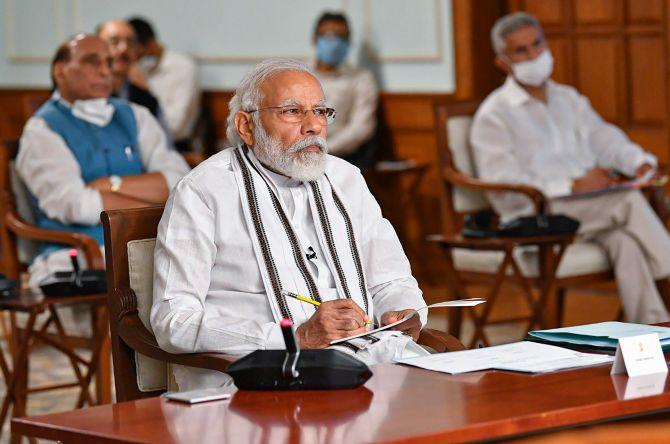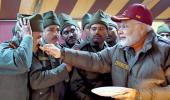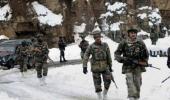'As his party's Supreme Leader, Modi has led India down the wrong road by insisting on friendship with China even as its soldiers went about claiming territory,' argues Harishchandra Dighe.

Prime Minister Narendra Damodardas Modi is solely responsible for the surprise attack by China that claimed the lives of 20 soldiers and the current mess India finds itself in vis-a-vis China.
Modi has invested more in befriending China than any other leader of India.
And his attempts to woo China is not a post 2014 phenomenon, but began many years earlier when he first became chief minister of Gujarat in 2001.
Following the Gujarat riots of 2002 and Modi being seen as a persona non grata in much of the Western world, he pursued economic relations with China, inviting investors and seeking to boost trade.
China built the Sardar Patel statue, which Modi loves to list as one of his key achievements.
Following his elevation to the prime ministership, Modi continued the same policy of wooing China, holding bilateral talks, seeking investment.
In this blinkered one-dimensional dealing with China, Modi forget the single most important difference between being the prime minister and being a chief minister.
The PM of India is responsible for the defence of India.
What has now emerged is that in his dealing with China, Modi behaved just like Jawaharlal Nehru; his and his party, the Bharatiya Janata Party's arch nemesis.
Despite the signs and signals at every stage, be it Doklam earlier or their comments following the separation of Ladakh into a separate Union territory, Modi refused to heed the warnings and continued to pretend that everything was fine.
It has often been said that one should choose one's enemies carefully because we become like our enemies.
The BJP, its predecessor the Bharatiya Jana Sangh, and its ideological mentor, the Rashtriya Swayamsevak Sangh, despise Nehru and all that he stood for.
They dislike Mahatma Gandhi too, especially blaming him for Partition and the vivisection of India, but given the Mahatma's phenomenal stature not just in India but globally, his avowed Hindu-ness (though they conveniently miss his equally avowed secularism), and his care for the poor, make it very difficult to target the Mahatma.
With Nehru, though, the BJP has been more successful in blaming him for all of India's ills, real or imagined.
This ideological attack has over the years been boosted by Nehru's descendants, who also went on to rule India and head the Congress party without challenge.
As historian Ramachandra Guha pointed out, Nehru is the ironical case where the sins of his descendants have been visited upon him -- the mistakes of Indira Gandhi, Rajiv Gandhi and Sonia Gandhi/Rahul Gandhi have all been blamed on Nehru's original sin of allowing his family to govern India.
Nehru's biggest mistake (one that has also harmed India immensely) is to have continued as prime minster for more than two terms.
Ideally, Nehru should have stepped aside in 1957 after completing 10 years, or certainly by 1962 (since India's first full elections were held in 1952).
No matter how good, quality of leadership declines, and Nehru was clearly in decline.
And we all know his single biggest blunder -- no, it wasn't taking Kashmir to the UN, but ignoring the threats of China even as he spoke of Hindi-Chini bhai bhai.
Over the last few decades, Indians have rightfully blamed Nehru for this single sin of commission and omission.
But to Nehru's credit, he was honestly seeking to befriend Beijing and China's attack in 1962 surprised everyone.
To Nehru's credit, he kept Parliament informed and faced the Opposition's barbs and vitriolic.
He agreed to his colleagues's demand to sack V K Krishna Menon.
But Nehru's China debacle gave the BJS/BJP a mantra -- everything wrong with India was Nehru's fault.
The 1962 defeat paved the way for every subsequent Indian victory in every war or border skirmish, be it 1965, 1967 (when the Chinese troops retreated), 1971, 1987, and finally 1999 (Kargil).
This has happened for two reasons.
First, post-1962, the Indian armed forces are now amongst the best in the world.
Second, our political leadership always put the national interest before politics and the ruling party's ideology which when it came to dealing with Pakistan and China.
And this has served India perfectly well till now.
Today, we are paying the price for Modi's intransigence when it comes to befriending China (even as it sought to keep a distance from Muslim Pakistan for ideological reasons and electoral benefits).
As his party's Supreme Leader, Modi has led India down the wrong road by insisting on friendship with China even as its soldiers went about claiming territory.
And now we have lost at least 20 soldiers.
Nehru at least heeded his colleagues's advice.
So while Nehru was hesitant to send troops in to force the Nizam of Hyderabad to accede to India, he allowed Sardar Patel to take the necessary steps.
Never did Nehru pull rank over Patel (and in 1961, followed Patel's tactics in dealing with Portuguese Goa).
Alas, in the current Cabinet, there is only one leader (and an acolyte); others's voices are never heard, let alone heeded.
When we have a leader who thinks he alone knows everything, who is blindsided by his ideology, then we are in trouble.
It still isn't too late for Modi.
But he needs to stop behaving like he has been doing so far.
Instead of making hollow announcements at 8 pm as has been his wont, he needs to summon Parliament and lay bare the facts, including owning up to his many mistakes so that the necessary amends may be made.
And most important, listen to his generals, especially those who don't agree with everything he says.
He still has time to salvage the situation.
Otherwise, Modi will be remembered as India's weakest PM!
Harishchandra Dighe is a political commentator.
Production: Aslam Hunani/Rediff.com










